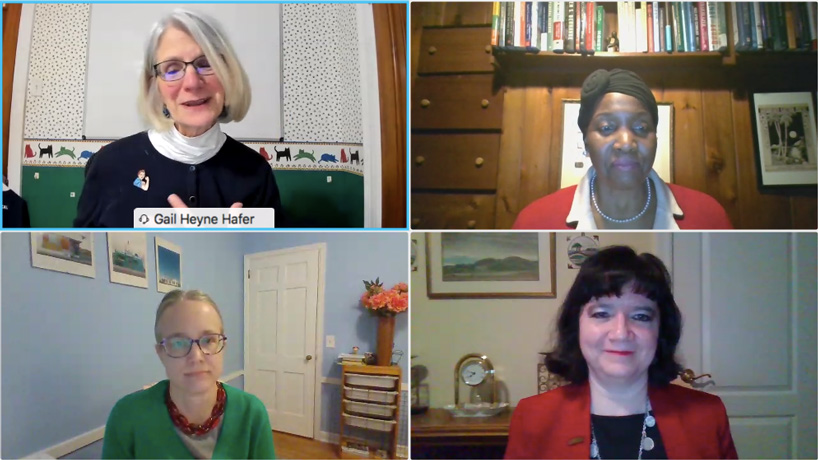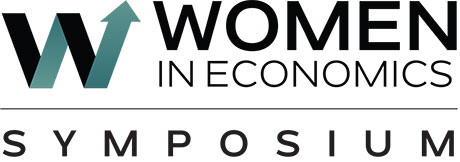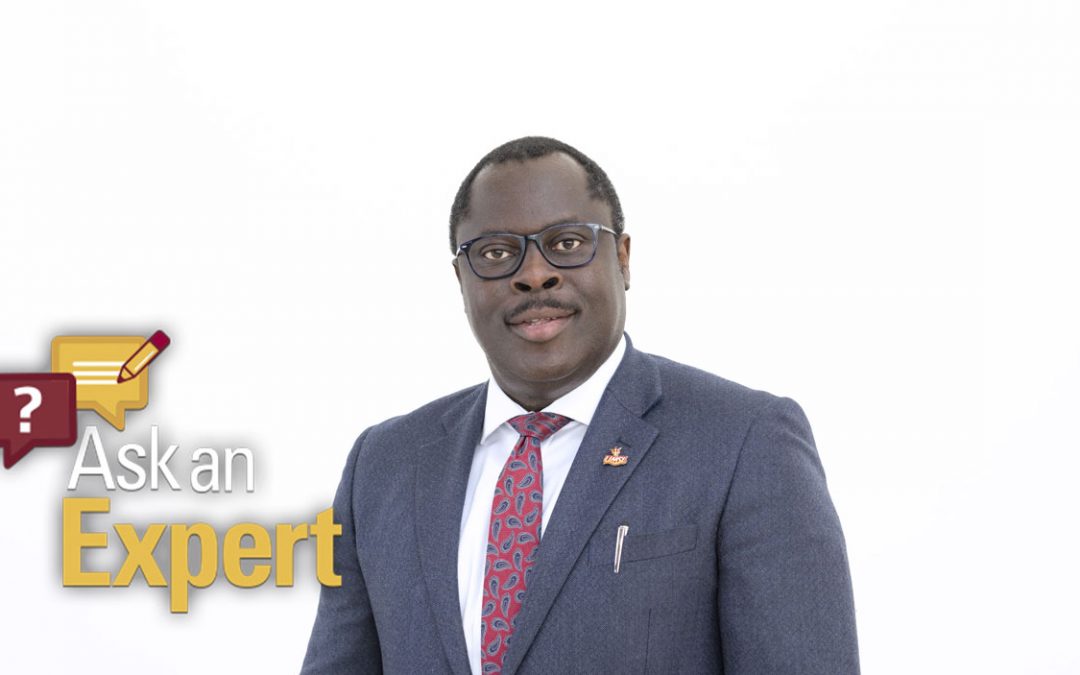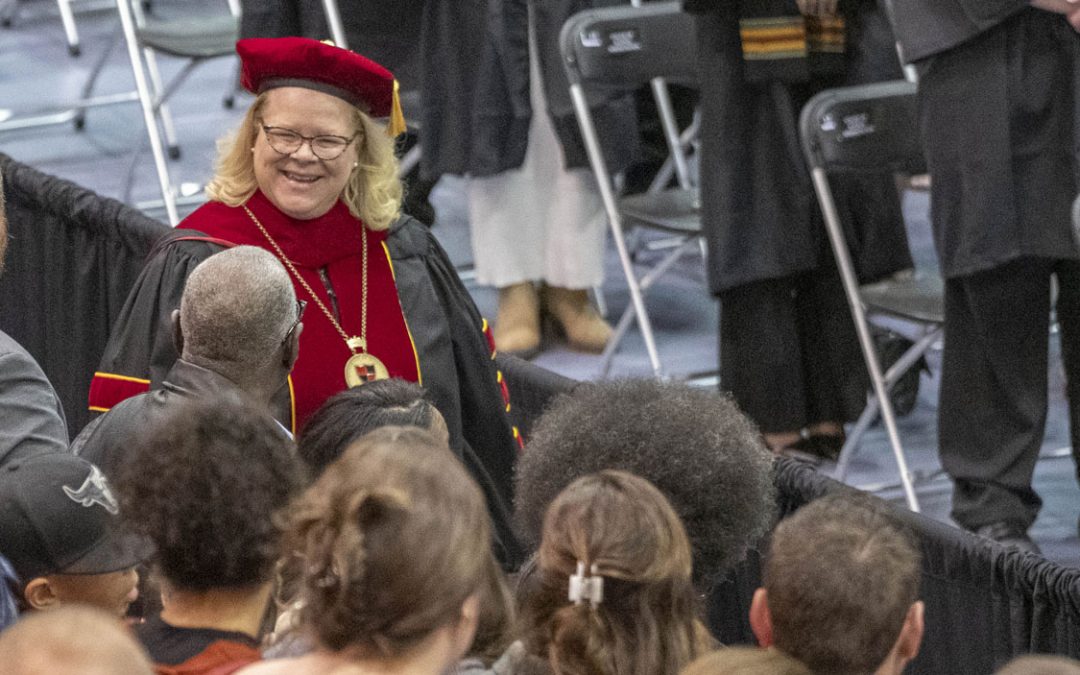
Marie Mora (bottom right), UMSL’s provost and executive vice chancellor for academic affairs, joined a panel moderated by Gail Heyne Hafer last Thursday during the second night of the Federal Reserve Bank of St. Louis’ Women in Economics Symposium. The other panelists were Lisa Cook (top right) and Abigail Wozniak (bottom left). (Screenshot)
Marie Mora has spent more than 25 years as an economist, with faculty appointments at the New Mexico State University, the University of Texas Pan–American and the University of Texas Rio Grande Valley before coming to the University of Missouri–St. Louis, where she serves as the provost and executive vice chancellor for academic affairs.
Last fall, Focus Economics ranked her among 75 “Top Economics Influencers to Follow” on social media.
 But speaking to an audience of more than 400 attendees – many of them high school and college students – of the Federal Reserve Bank of St. Louis’ Women in Economics Symposium, Mora revealed how close she came to ending up in a different field.
But speaking to an audience of more than 400 attendees – many of them high school and college students – of the Federal Reserve Bank of St. Louis’ Women in Economics Symposium, Mora revealed how close she came to ending up in a different field.
“It was not something I intended to major in,” Mora said of economics. “In fact, I literally took classes to avoid economics. As an undergraduate, I heard horrible, horrible things about econ – that it was hard. It was confusing. I was going to major in anthropology and minor in sociology. What happened is that I took a course in anthro, and I still remember the title of the course all these years later. It was called ‘Modernization of traditional society,’ and in that particular course, we did a lot of studies and a lot of readings about economic development, and that course changed my mind because it made me realize that what I thought was economics wasn’t really economics.”
Mora was speaking as part of a panel moderated by St. Louis Community College–Meramec Professor Gail Heyne Hafer and was joined by Lisa Cook, a professor of economics and international relations at Michigan State University, and Abigail Wozniak, a senior research economist at the Federal Reserve Bank of Minneapolis.
Cook had her own story of almost going into another discipline before happenstance pulled her toward economics.
That’s a familiar refrain among many of the women who are working in a field still overwhelmingly populated by men.
The goal of the annual symposium, started in 2018 along with the St. Louis Fed’s “Women in Economics” podcast series, is to “connect young women with accomplished women in the economics profession who share the story of their career journey — helping inspire women who wonder if economics is a profession they should (and actually could) pursue.”
Mora has devoted much of professional life to encouraging not only women but also underrepresented minority students to consider economics, and she spent seven years as the director of the American Economic Association Mentoring Program.
Opinions from a diverse workforce are critical for the field of economics to be able to effectively identify problems and try to arrive at solutions. Mora was asked about how to confront a potentially toxic environment that might keep women from pursuing careers in economics.
“In order to help navigate this potentially toxic environment, I think it’s really helpful that potential women economists know that there is a very supportive network out there,” she said. “It’s important to know that you’re not alone. The American Economic Association has made great, great strides over the past couple of years to try to build a more cohesive and collegial environment.”
UMSL was well represented among the presenters throughout the symposium.
Mary Suiter, an UMSL economics alumna, serves as the assistant vice president and economic education officer at the St. Louis Fed, has been a driving force behind the creation of the symposium. She also moderated the opening-night panel, which featured Wednesday’s keynote speaker, Wozniak, as well as Brigitte Madrian, the dean and Marriott Distinguished Professor at Brigham Young University’s Marriott School of Business, and Nancy Rose, the Charles P. Kindleberger Professor of Applied Economics at the Massachusetts Institute of Technology.
On Wednesday night, Professor Emeritus Susan Feigenbaum was one of the panelists in a breakout session on “Making a Difference Using Health Care Economics” while Professor Lea-Rachel Kosnik was featured in another breakout session on “Making a Difference Using Environmental Economics.”
Professor Anne Winkler, the chair of UMSL’s Department of Economics, took part in a pair of breakout sessions – “What Can I Do with a Bachelor’s or Master’s Degree in Economics?” and “Working in Academia: Research and Teaching.”














